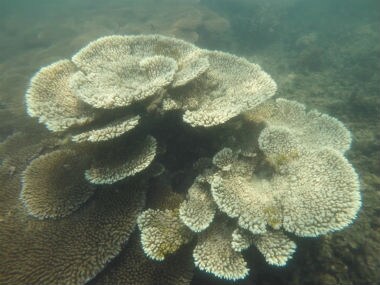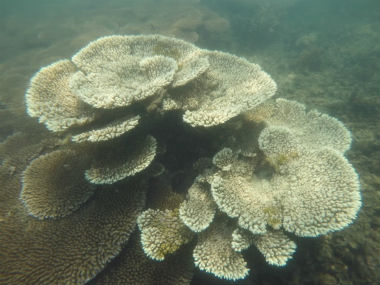Corals lose their beautiful colours and even die during a coral bleaching event. The corals in the Gulf of Mannar suffered severe losses during the global coral bleaching event that occurred between March and October 2016, according to new data published now. [caption id=“attachment_4479947” align=“alignleft” width=“380”]  Coral Acropora cytherea[/caption] A joint team of researchers from Suganthi Devadason Marine Research Institute, Gulf of Mannar Marine National Park and Department of Environment of Tamil Nadu, which conducted intensive underwater surveys, have found high extent of coral bleaching and subsequent mortality. The study results have been published in journal Current Science this month. Coral bleaching refers to the loss of zooxanthellae which gives colour to corals. The absence of it makes corals white or bleached. Coral bleaching is a general response of corals in increased sea surface temperature. “Bleaching can happen when sea surface temperatures increase by 1 to 2 degree Celsius. Coral would recover if normal temperature returns within a short period, but if the temperature stress continues for a long-term, corals will eventually die,” explained Dr Patterson Edward, director of Suganthi Devadason Marine Research Institute, while speaking to India Science Wire. Corals are marine animals, typically living in compact colonies, while coral reefs are the diverse underwater ecosystems built by coral colonies. Coral reefs have the highest biodiversity of any marine ecosystem, providing important and direct economic benefits to people. In the past few decades, coral reefs have undergone a dramatic degradation due to various natural and human-induced activities. Scientists observed 24 percent coral bleaching with 16 percent mortality and live coral cover decrease to 23 percent during March to June 2016. The water temperature was recorded between 31.2 to 32.6 degree Celsius, which started decreasing in July 2016 and it reached around 27 degrees in October 2016. The rate of mortality varied with coral species. The fast-growing species such as Acropora, Montipora, and Pocillopora have severe mortality, while massive and slow growing species of corals, like Porites, Favia, and Favitesare resistant to the bleaching and escaped death. “The local annual variation of coral cover and coral bleaching occur during the late April when sea surface temperature rises 2 to 3 degrees, but they tend to recover within a period of three months when the normal temperature returns. In general, annual bleaching event does not cause mortality. The coral bleaching and severe mortality during 2010 and 2016 are due to global coral bleaching events,” Dr Diraviya Raja, a member of the research team, told the India Science Wire. Gulf of Mannar is one of the four major coral reef areas in India with 117 corals species, formed mainly around 21 uninhabited islands situated between Rameswaram and Tuticorin. The coral reef area declared as the Gulf of Mannar Marine National Park has been monitored since 2003. The first global bleaching event had occurred in 1998. Increase in global average temperature during the past few decades, become a major threat to the reefs for coral bleaching and mortality. The research team included JK Patterson Edward, G Mathews, K Diraviya Raj, RL Laju, M Selva Bharath, A Arasamuthu, P Dinesh Kumar, Deepak S Bilgi and H Malleshappa India Science Wire
Scientists observed 24 percent coral bleaching with 16 percent mortality and live coral cover decrease to 23 percent during March to June 2016.
Advertisement
End of Article


)
)
)
)
)
)
)
)
)



